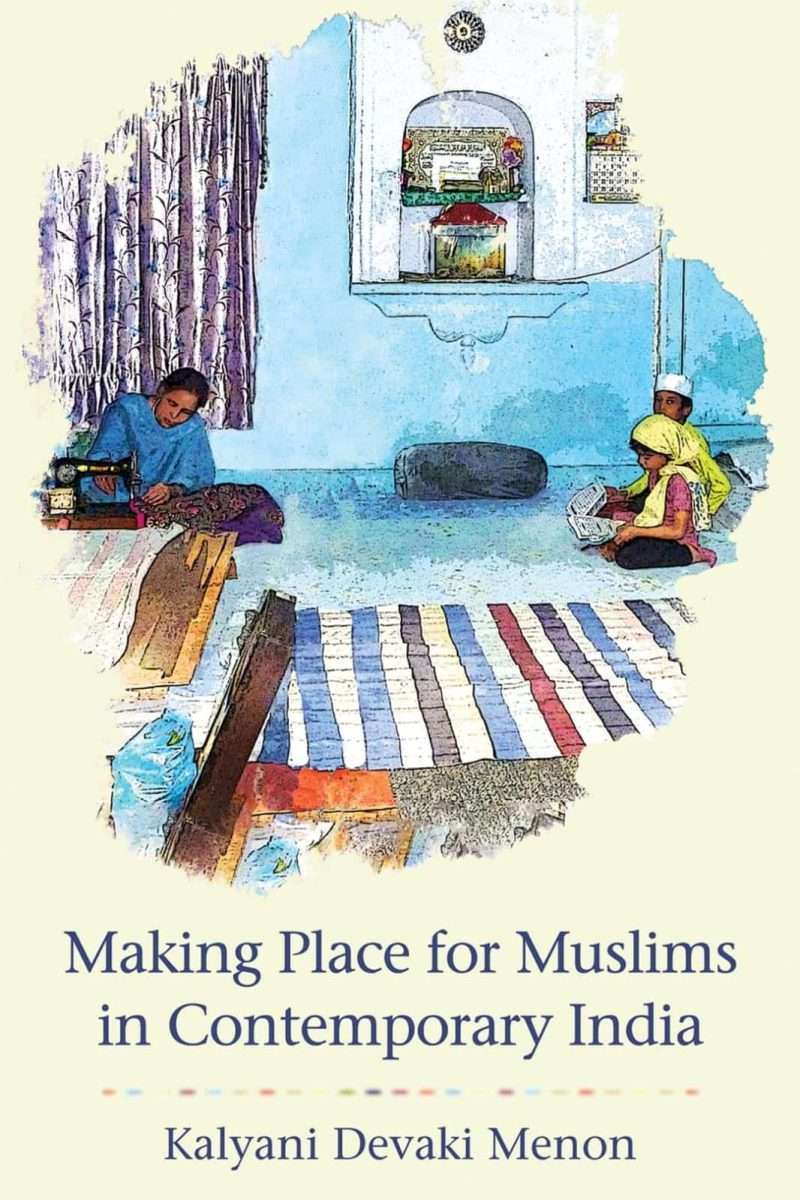Kalyani Devaki Menon, Making Place for Muslims in Contemporary India (Ithaca and London: Cornell University Press, 2022)
Reviewed by Ajwa Hijazi
Kalyani Devaki Menon’s ‘Making Place for Muslims in Contemporary India’ is an insightful gateway into the challenges faced by Indian Muslims to survive in a country treading on the path of exclusionary and majoritarian politics. Working currently, as a Professor of religious study at DePaul University, Chicago, Menon, has previously also written a book titled ‘Everyday Nationalism’ on the religious politics of Hindu rights.
In her latest book, the author, through her fieldwork in Delhi among Muslim communities, shares accounts of various individuals on how Muslims made their place in India by disrupting majoritarian constructions of the country as a Hindu place that places upper-caste Hindus as the normative national subject (p.4).
This book is divided into two parts and five chapters. The first part contains the first two chapters, while the second part consists of three chapters. The first chapter highlights how Muslims are steering through a land of inequality where anti-Muslim prejudices and stereotypes, along with precarious socioeconomic conditions, make them insecure. The second chapter examines how diverse groups of economically underprivileged Muslims, especially women, make ends meet and support their families in a so-called ‘neoliberal’ India. The third chapter explains how Muslim women are questioning local and global islamophobia to ‘make a place’ for themselves in India and the world. The next chapter underscores how Muslims live with each other amidst sectarian divisions while trying to forge a common culture. The last chapter highlights the construction of religious subjectivity of Muslims belonging to various sects and maslaks.
Menon traces the political and cultural transformation of Mughal Shahjahanabad to Old Delhi (British-controlled) and Delhi 6 (emerged after violent transformations of post-colonial India). She emphasises that due to the enduring legacy of violent transformation, Muslims were regarded as suspicious, denied jobs, and constructed as ‘others’ (p.9). She eloquently stresses that the marginalisation of Indian Muslims is not just the result of the rise of the Hindu right, rather it is more broadly inculcated in the political landscape of the state (p.11). While citing personal accounts of various interlocutors of Old Delhi, she opines that the marginal socioeconomic conditions of Muslims are further enabled by Islamophobia, anti-Muslim prejudice, violence, and surveillance (p.15), eventually making Muslims insecure (p.39). She further discusses the Sachar Committee report (2006) which states that Muslims face systematic violence, where their legal citizenship does not guarantee the same rights as the Hindu citizens (p.39). The various accounts presented in the book reflect the prevalent patterns of Hindu chauvinism and anti-Muslim violence that compel Muslims to live in tight-knit Muslim blocks and neighbourhoods (i.e., Old Delhi) where they feel comparatively secure (p.40).
While narrating the precarious economic insecurity faced by Muslims in Old Delhi, the author emphasises the role of Muslim women who, amidst communal violence, are defying gendered stereotypes and ensuring the survival of their families by working and running small businesses (p.71). She also sheds light on the internal issues of Muslim communities residing in Old Delhi, such as the presence of various religious discontents within the communities. However, she asserts that despite the presence of sectarian differences, Muslims from multiple sects agree on one thing: Islam condemns violence (p.127). In stark contrast, Kalyani Devaki Menon links the tremendous upsurge of religious violence in India with the rise of the Hindu right, under the banner of the Bharatiya Janata Party (BJP).
Attempting to find a silver line amidst the melancholic narratives of exclusion, she states that there were also instances of inclusion. The protest against the discriminatory Citizenship Amendment Act (2019) in the Shaheen Bagh was a testament to the inclusionary camaraderie of communities since that protest, led by Muslim women (especially dadis), was also attended by Hindus, Sikhs, and Christians (p.135). Nonetheless, Menon rightly concludes that, ultimately, it is dangerous to claim a place in Modi’s India since the anti-CAA protests were also met with violent retribution (p.162). In the end, she contends that despite the marginalisation, dispositions, fascism, and alienation, Muslims have continued to live bravely and forge a community (p.161).
Kalyani Devaki Menon has tried to present a first-hand account of the everyday struggles of being a Muslim in India through the diverse range of interlocutors of Old Delhi. However, in the second part of the book, she could have emphasised more on the common issues faced by Muslims of all sects and maslaks under the far-right majoritarian rule of BJP (which is hampering their social and political standing in India) instead of giving more space to their internal discord.
All in all, it is an immersive and well-rounded book that reflects how Muslims navigated the violence of Partition, political and economic marginalisation in post-colonial India, and the Hindu-majoritarian and anti-Muslim politics that dominates today’s contemporary India. With elections in India unfolding, this book is a timely read, especially, for students and academics of international relations, minority studies, and religious studies to understand the glaring state of Muslim suppression in India, which has been a constant feature of consecutive BJP governments.
Ajwa Hijazi is a Research Assistant at the Centre for Aerospace & Security Studies (CASS), Islamabad, Pakistan. She can be reached at cass.thinkers@casstt.com.




